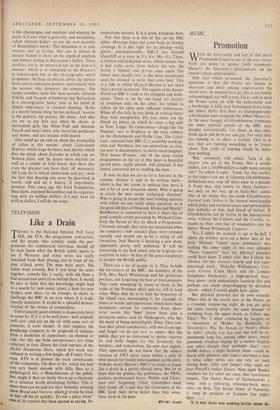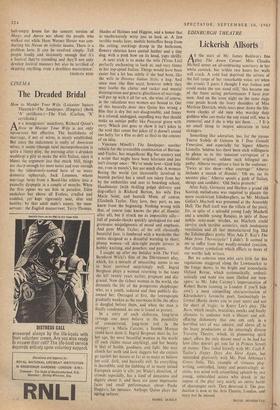MUSIC
Promotion
WITH the forty-ninth and last of this year's Promenade Concerts out of the way, every- body sits down to answer (with comments, please!) the Spectator's questionnaire on the
season's main achievements. , One fact which prompted the Spectator's questions is that the Proms are unique in character and merit among concert-series the, world over. As musical facts go, this is not widely acknowledged, nor will it ever, I fear, sink in until the Proms catch on with the fashionable and a footbridge is built over Kensington Gore from the Albert Hall's first floor to champagne-and- cold-chicken tents alongside the Albert Memorial.
At the mere thought of Glyndebourne trimrhings the inner musical synods of the BBC may shudder calvinistically. Let them, in that case, think again and be brave and gay. For what they are running is, in effect, a festival. That is to say, they are running something to be festive about. Ten yards of bunting would be better than nothing.
'But,' somebody will object, 'look at the singers you get at the Proms. Not a world- shaker, not a 10,000-dollars-a-night name among 'ern!' To which I reply : 'Look, for that matter, at the singers you get at Glammy Glyndebourne.
Sutherland may stop off there once in a decade.
A Freni may sing twenty or thirty Zerlinas- but only on her way up to Scala-Met. status.
One of the things that has made Glyndebourne Festival truly festive is the intense musicianship which picks and nurtures voices and personalities that nobody, or few, had heard of before. If Glyndebourne can be festive in the international sense without the Callases and the Corellis, so, thanks to their own line of uniqueness, can the Henry Wood Promenade Concerts.
'Yes, I admit the acoustic is apt to be hell. I admit the wireless gave me a better idea of the hash Michael Tippett (qua conductor) was making the other night of his own splendid "Piano Concerto" than my physical presence could have done. I admit also that I chose the
wireless for this season's fourth and last com- missioned work: Malcolm Williamson's Con- certo Grosso (Colin Davis and the London Symphony Orchestra): a high-spirited, busy- busy piece----with enchantingly facetious bits and perhaps too much chug-chugging by detached chords—which I would gladly hear again.
'But physical presence has its own rewards Where else in the world save at the Proms on a crowded, conquering night, do you get quite the same roaring cheers, the same thunder of stamping from the upper levels, as follow, say, Elgar's No. 2 when conducted by Sargent, or
a, mountain of Mahler by Barbirolli, or
Stravinsky's Rite by Dorati or Verdi's Otello by Solti? (Otello was last year but will be re- membered long for, among other assets, much genuinely Verdian singing by a mainly English cast who—though they probably don't earn 10,000 dollars a night between them—could be heard with pleasure and respect anywhere.) And in what other series can one rely on such elating hops, skips and jumps? One night we hear Purcell's Indian Queen. Next night Boulez conducts his Le soled des eaux, that translucent enigma. The Stabat Mater of Szymanowski is sung : and a yellowing reference-book entry takes on flesh. The Stabat Mater of Palestrina is sung as pendant or footnote five nights later. . . • 'It is true there was nothing festive about the
half-empty house for the concert version of Moses and Aaron nor about the people who walked out while Hans Werner Henze was con- ducting his Novae de infinito laudes. There is a problem here. It can be resolved simply. Tell people loudly and insistently enough that it's a festival they're attending and they'll not only develop festival manners but also be terrified of skipping anything, even a deathless masterpiece.'
CHARLES REID



































 Previous page
Previous page